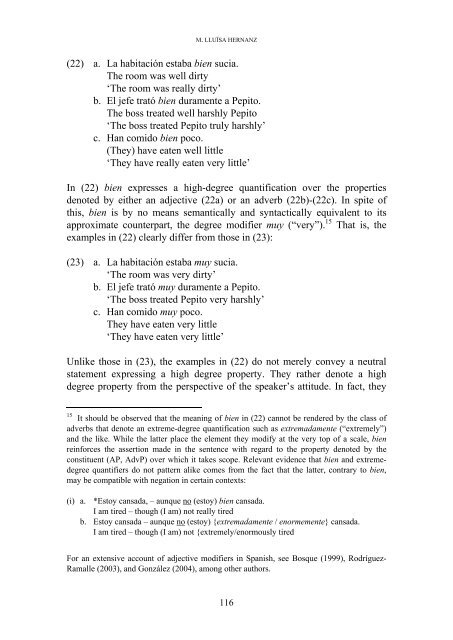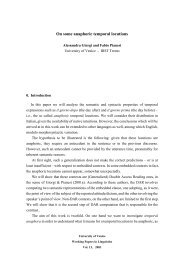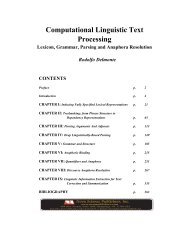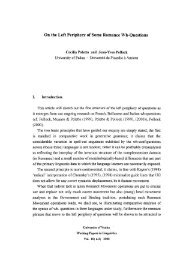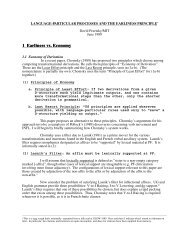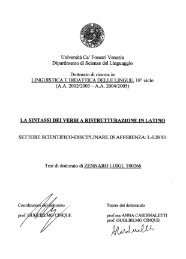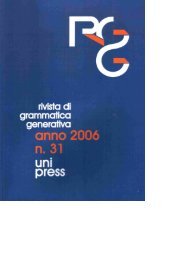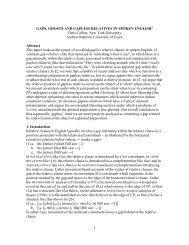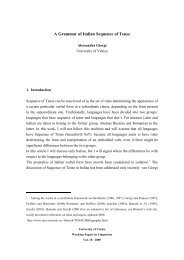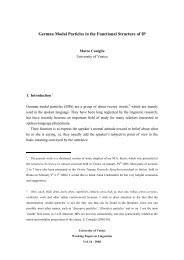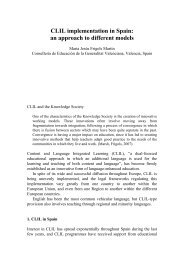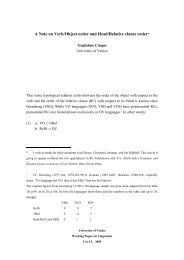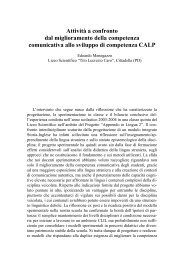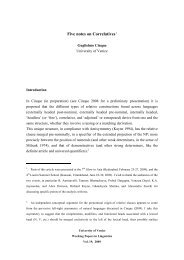Emphatic Polarity and C in Spanish - Lear
Emphatic Polarity and C in Spanish - Lear
Emphatic Polarity and C in Spanish - Lear
Create successful ePaper yourself
Turn your PDF publications into a flip-book with our unique Google optimized e-Paper software.
M. LLUÏSA HERNANZ<br />
(22) a. La habitación estaba bien sucia.<br />
The room was well dirty<br />
‘The room was really dirty’<br />
b. El jefe trató bien duramente a Pepito.<br />
The boss treated well harshly Pepito<br />
‘The boss treated Pepito truly harshly’<br />
c. Han comido bien poco.<br />
(They) have eaten well little<br />
‘They have really eaten very little’<br />
In (22) bien expresses a high-degree quantification over the properties<br />
denoted by either an adjective (22a) or an adverb (22b)-(22c). In spite of<br />
this, bien is by no means semantically <strong>and</strong> syntactically equivalent to its<br />
approximate counterpart, the degree modifier muy (“very”). 15 That is, the<br />
examples <strong>in</strong> (22) clearly differ from those <strong>in</strong> (23):<br />
(23) a. La habitación estaba muy sucia.<br />
‘The room was very dirty’<br />
b. El jefe trató muy duramente a Pepito.<br />
‘The boss treated Pepito very harshly’<br />
c. Han comido muy poco.<br />
They have eaten very little<br />
‘They have eaten very little’<br />
Unlike those <strong>in</strong> (23), the examples <strong>in</strong> (22) do not merely convey a neutral<br />
statement express<strong>in</strong>g a high degree property. They rather denote a high<br />
degree property from the perspective of the speaker’s attitude. In fact, they<br />
15 It should be observed that the mean<strong>in</strong>g of bien <strong>in</strong> (22) cannot be rendered by the class of<br />
adverbs that denote an extreme-degree quantification such as extremadamente (“extremely”)<br />
<strong>and</strong> the like. While the latter place the element they modify at the very top of a scale, bien<br />
re<strong>in</strong>forces the assertion made <strong>in</strong> the sentence with regard to the property denoted by the<br />
constituent (AP, AdvP) over which it takes scope. Relevant evidence that bien <strong>and</strong> extremedegree<br />
quantifiers do not pattern alike comes from the fact that the latter, contrary to bien,<br />
may be compatible with negation <strong>in</strong> certa<strong>in</strong> contexts:<br />
(i) a. *Estoy cansada, – aunque no (estoy) bien cansada.<br />
I am tired – though (I am) not really tired<br />
b. Estoy cansada – aunque no (estoy) {extremadamente / enormemente} cansada.<br />
I am tired – though (I am) not {extremely/enormously tired<br />
For an extensive account of adjective modifiers <strong>in</strong> <strong>Spanish</strong>, see Bosque (1999), Rodríguez-<br />
Ramalle (2003), <strong>and</strong> González (2004), among other authors.<br />
116


